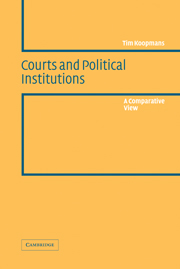Book contents
- Frontmatter
- Contents
- Preface
- Table of cases
- List of abbreviations
- 1 Introduction
- 2 The Sovereignty of Parliament
- 3 Judicial review of legislation
- 4 The growth of judicial power
- 5 The limits of judicial review
- 6 The legality of administrative action
- 7 Courts and governments
- 8 Courts and individual rights
- 9 Techniques of judicial protection
- 10 A glance at the future
- Select bibliography
- Index
- Frontmatter
- Contents
- Preface
- Table of cases
- List of abbreviations
- 1 Introduction
- 2 The Sovereignty of Parliament
- 3 Judicial review of legislation
- 4 The growth of judicial power
- 5 The limits of judicial review
- 6 The legality of administrative action
- 7 Courts and governments
- 8 Courts and individual rights
- 9 Techniques of judicial protection
- 10 A glance at the future
- Select bibliography
- Index
Summary
Authors may not always be fully aware why they write their books. When composing this book, I felt that my reasons were simple and compelling. When I returned to teaching law at a somewhat advanced age, I happened to rediscover how much comparative methods help to develop students' ability to define legal problems and to collect materials for solving them. Moreover, there is something exciting for them in being exposed to ways of reasoning they are not familiar with. I wrote the book in the hope that any serious reader of it would have the same experience.
The reader I had in mind was the senior student of law, history or political science, not necessarily British or American, with a certain interest in general problems of law or politics, or with a cosmopolitan view of life in society. However, other readers, whatever their background or their vocation in life, may also benefit from the methods I have used for making foreign constitutional systems accessible by comparing them to others. Constitutional law, if well explained, is not all that difficult to understand.
The book could not have been written without the help of a number of persons and institutions. I am thinking, in particular, of the Cambridge law faculty, which provided me in 1999–2000, when I was Goodhart Professor of Law, with a tiny little office in the heart of the Squire Law Library, very close to the law reports.
- Type
- Chapter
- Information
- Courts and Political InstitutionsA Comparative View, pp. viii - ixPublisher: Cambridge University PressPrint publication year: 2003

